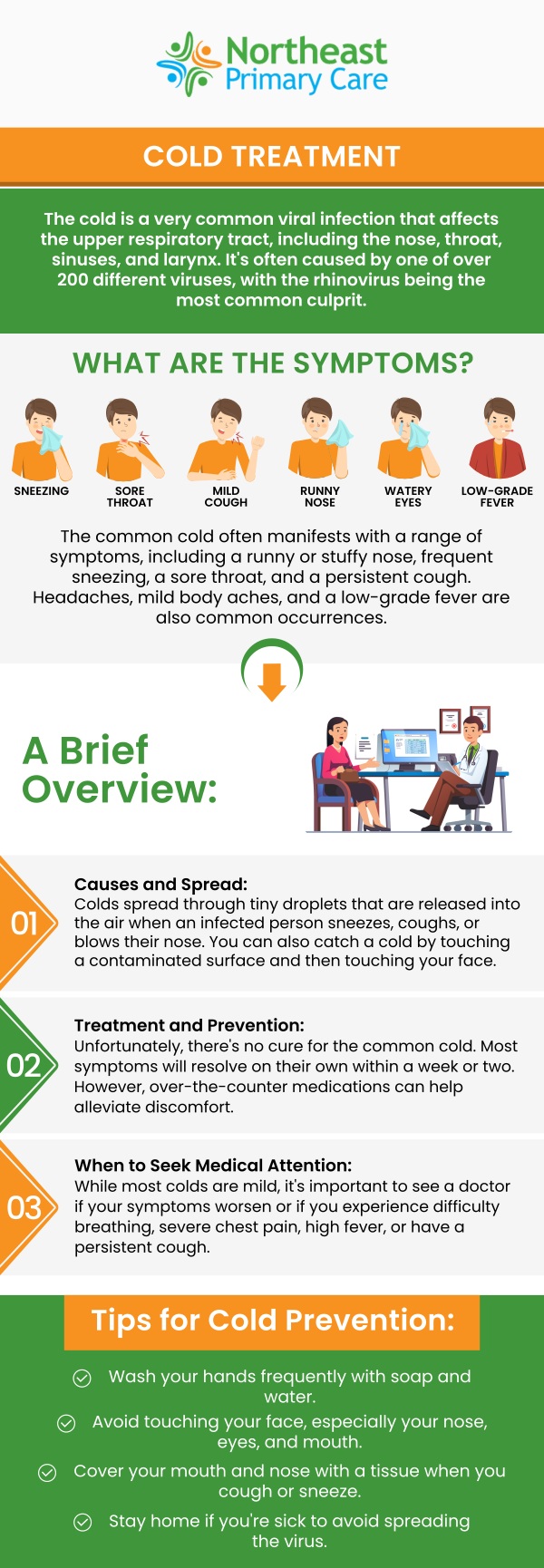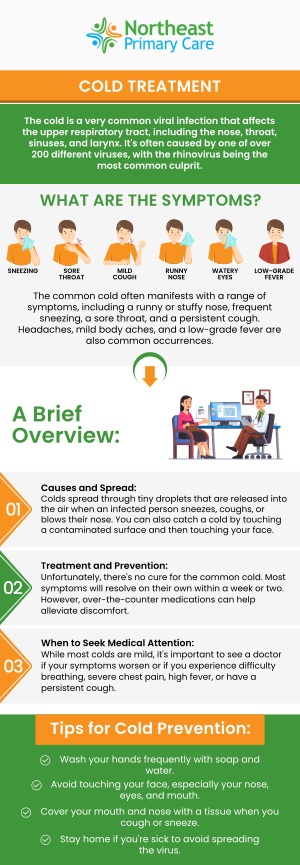Does Blowing Your Nose Make Cold Symptoms Worse?
Blowing your nose is a natural response when you’re congested, but it can sometimes worsen your cold symptoms. While it may provide temporary relief, blowing your nose too hard can irritate the nasal passages, increase inflammation, and worsen sinus pressure. At Northeast Primary Care, our professional team offers treatment options to help manage your cold symptoms effectively, providing expert care to guide you toward the best relief. For more information, please contact us or schedule an appointment online. We have convenient locations to serve you in Mineola, NY, and Melville, NY.


Table of Contents:
Is it better to let your nose run when you have a cold?
What are the stages of most colds, and how long does each stage last?
Does blowing your nose make it more stuffy?
What are the signs your cold is getting better?
Coping with a cold can be uncomfortable and distracting from your daily routine. When experiencing cold symptoms, your body naturally produces mucus as a defense mechanism. This mucus helps trap viruses, bacteria, and foreign particles, preventing them from spreading deeper into your respiratory system. Allowing your nose to run can, therefore, play a beneficial role in clearing irritants and pathogens from your nasal passages. However, excessive mucus production can lead to discomfort, nasal congestion, and irritation, making breathing and daily activities more challenging. Gently blowing your nose to remove excess mucus can provide relief and comfort.
It’s important to maintain a balanced approach. Avoid blowing your nose too forcefully or frequently, as this can irritate the nasal passages and cause inflammation or sinus pressure. Ignoring a runny nose could also prolong congestion. Gentle methods such as softly blowing your nose, using nasal saline rinses, or using a humidifier can help. Staying hydrated also helps thin mucus, making it easier for the body to clear naturally.
If your symptoms become severe, last longer than usual, or are accompanied by other concerning signs such as fever, facial pain, or sinus pressure, our healthcare professionals are here to help.
We are committed to helping our patients understand common illnesses, such as the cold, to promote better recovery and overall health. Most common colds progress through several stages, each with specific symptoms and durations. The first stage is the incubation period, lasting one to three days, where you may not notice any symptoms, but the virus is actively replicating in your body. This is followed by the early symptom phase, typically lasting one to two days, where mild throat irritation, fatigue, or slight body aches may appear as your immune system responds to the virus.
Next, the cold enters the peak or acute stage, usually lasting three to five days, marked by more noticeable symptoms like nasal congestion, sneezing, coughing, a runny or stuffy nose, and sometimes a low-grade fever. Increased mucus production and general discomfort or fatigue are also common. Finally, during the recovery stage, which lasts about three to seven days, symptoms ease, and energy levels gradually return to normal. Some mild symptoms, such as a lingering cough or congestion, may persist for up to two weeks, but most colds resolve completely within seven to ten days.
However, if you notice symptoms worsening significantly after the first week, or if you experience severe cough, high fever, or difficulty breathing, our skilled team at Northeast Primary Care can evaluate your symptoms and ensure your quick and safe recovery.
Nasal congestion can be uncomfortable and frustrating. While blowing your nose may seem like a quick and easy way to relieve congestion, frequent or forceful blowing can sometimes make symptoms worse. Vigorous nose-blowing can push mucus deeper into your sinuses, leading to irritation, increased inflammation, and more congestion. It may also irritate the sensitive lining of your nasal passages, making it harder to breathe comfortably.
To avoid this, it’s best to blow your nose gently, one nostril at a time, and lightly close the other nostril to reduce pressure. Staying hydrated, using saline nasal sprays or irrigation, and maintaining proper humidity with a humidifier can help ease congestion more effectively and safely.
If your nasal congestion persists or worsens despite these gentle measures, the healthcare providers at Northeast Primary Care are here to help. Our experienced team can evaluate your symptoms, rule out underlying issues such as allergies, infections, or sinusitis, and guide you toward appropriate treatment options. Your comfort and wellness are always our top priority.
Typically, you can expect several indicators that you’re on the path to wellness:
One of the first signs of recovery is a decrease in nasal congestion and a reduction in your runny nose, allowing for easier breathing. You’ll also notice a decrease in coughing frequency and intensity, with less irritation or soreness in your throat.
Another positive sign is the gradual return of energy levels. While fatigue and weakness are common at the start of an illness, as you recover, you should begin to feel more energetic and able to resume your regular activities. Along with increased energy, sleep quality typically improves as symptoms such as congestion, coughing, and general discomfort decrease.
Additionally, a reduction in body aches and headaches often indicates that your immune system is effectively addressing the illness. As you continue to heal, you may notice your appetite returning, along with your sense of taste and smell, which can be diminished during illness. It’s important to monitor these improvements—easier breathing, reduced coughing, increased energy, better sleep, fewer aches, and improved appetite. If your symptoms persist, worsen significantly, or if you have any concerns, please reach out to a healthcare professional for guidance.
At Northeast Primary Care, we’re here to guide your recovery and provide personalized care to keep you and your family healthy. If you’re experiencing cold symptoms, our professional team is ready to offer effective treatment options tailored to your needs. At Northeast Primary Care, we also provide comprehensive preventive care services and vaccinations to help maintain your overall health and well-being. Contact us today or schedule an appointment and start your path to feeling better. We have convenient locations to serve you in Mineola, NY, and Melville, NY. We serve patients from Mineola NY, Melville NY, Jericho NY, Floral Park NY, East Meadow NY, Westbury NY, Huntington NY, Plainview NY, Levittown NY, and surrounding areas.

Check Out Our 5 Star Reviews


Additional Services You May Need

Additional Services You May Need
- Annual Physical Exam
- CDL (Commercial Driver License)
- Acute & Chronic Illness
- Covid 19
- EKG
- Healthy Aging
- Immigration Physical Exams
- Primary Care
- Preventive Care
- Diet and Nutrition
- General Care
- Management Of Diabetes
- Medical Clearance
- Pre-Employment Physicals
- Sick Visits
- STD Testing
- Women’s Health
- Drug Testing
- Internal Medicine Doctor
- Vaccines and Flu Shots
- Allergy Testing
- Spirometry







